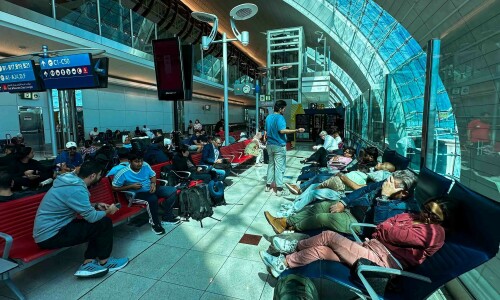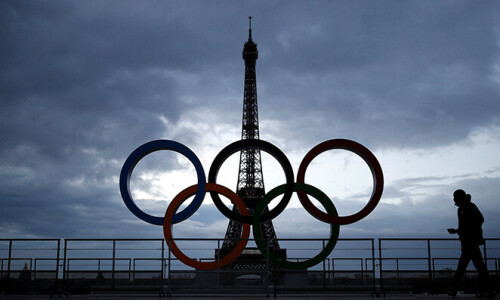UNITED NATIONS: Pakistan made a joint statement on behalf of 55 countries at the United Nations on Tuesday evening, declaring Hong Kong an inalienable part of China and urging foreign forces not to interfere in Beijing’s internal affairs.
Cuba, too, made a joint statement on behalf of 45 countries in support of China’s counter-terrorism measures in Xinjiang. Kuwait made a similar statement supporting China on behalf of three Arab nations.
“The Hong Kong special administrative region is an inalienable part of China, and Hong Kong affairs are China’s internal affairs that brook no interference by foreign forces,” Pakistan’s Permanent Representative to the UN, Ambassador Munir Akram, told the General Assembly’s Third Committee.
Earlier on Tuesday, Germany led a group of 39 countries in the UN that condemned China’s policies in Xinjiang, Hong Kong and demanded “immediate, meaningful and unfettered access” to Xinjiang to probe charges of human rights violations in the region.
Debt relief sought to recover from Covid-19 crisis
The United States, Britain, Canada, Australia and New Zealand also signed this joint statement that expressed deep concerns about the political situation in Hong Kong as well. In 2019, a similar text drafted by Britain secured only 23 signatures.
The decision not to ask a Muslim country to lead the support group on Xinjiang reflects Beijing’s awareness of the sensitivities associated with this issue. It would have been embarrassing for Muslim nations to take a public position on a Muslim majority region.
Other Muslim countries that supported China’s position on Hong Kong include Iran, Iraq, Bangladesh, Algeria, Afghanistan, Egypt, Bahrain, Eritrea, Mauritania, Morocco, Palestine, Somalia, Saudi Arabia, Sudan, Syria, United Arab Emirates and Yemen.
Russia, Syria, North Korea and Venezuela signed both statements, drafted by Pakistan and Cuba.
Pakistan’s statement reminded UN members that non-interference in the internal affairs of sovereign states was an important principle enshrined in the Charter of the United Nations and the basic norm of international relations.
“We support China’s implementation of ‘one country, two systems’ in the Hong Kong Special Administrative Region. In any country the legislative power on national security issues rests with the state,” said Ambassador Akram while reading the statement on behalf of 54 other member states.
The statement noted that the enactment of China’s law on safeguarding national security in Hong Kong was a legitimate measure which “ensures that one country, two systems go steady and enduring and that Hong Kong enjoys long-term prosperity and stability”.
Ambassador Akram said that “legitimate rights and freedoms of Hong Kong residents can be better exercised in a safe environment”.
Germany’s UN Ambassador Christoph Heusgen, however, said the countries that signed his statement were “gravely concerned about the human rights situation in Xinjiang and the recent developments in Hong Kong”.
Zhang Jun, China’s permanent representative to the UN, on Monday made a joint statement on behalf of 26 countries, criticising the US and other Western countries for violating human rights, calling for the complete and immediate lifting of unilateral sanctions, and expressing grave concern over systematic racial discrimination.
In Beijing, the Chinese foreign ministry said that about 70 states had supported its policies on Hong Kong and Xinjiang at the Third Committee of the 75th UN General Assembly.
“China is firmly opposed to anyone, any country or any force creating instability, secessionism or unrest in China,” the ministry’s spokesperson Hua Chunying said on Wednesday. “We also are firmly opposed to political manipulation on issues related to Hong Kong and Xinjiang and interference in China’s internal affairs.”
She said that China was ready to work with all parties to “carry out constructive dialogue and cooperation based on the principle of equality and mutual respect”.
APP adds: Mr Akram, while highlighting Prime Minister Imran Khan’s debt relief appeal at the UN, said on Wednesday it was one of the quickest ways to create fiscal space for developing countries to recover from the grave crisis set off by the coronavirus pandemic,
“With adequate financial and technological support, developing countries can build sustainable economic models without sacrificing growth,” the ambassador told the General Assembly’s Second Committee, which deals with economic and financial matters.
Published in Dawn, October 8th, 2020















































Dear visitor, the comments section is undergoing an overhaul and will return soon.